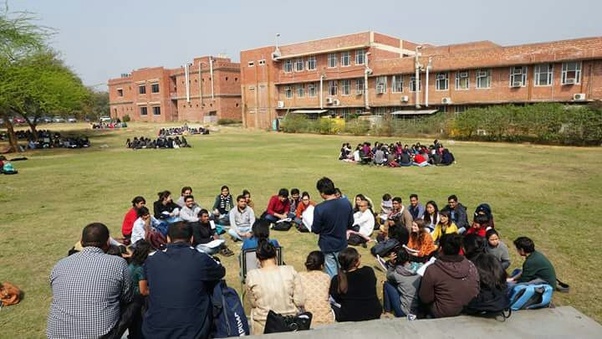The New Leam has been working in the field of education for quite some time. It is happy to introduce a new column-a series of letters that Professor Avijit Pathak would write to young students pursuing humanities and social sciences at the school level. As an innovative pedagogic form, a letter of this kind is likely to arouse the imagination of students, and make them experience joy and meaning in learning-something that is becoming increasingly rare in an environment filled with utilitarian coaching centres and obsessive exam anxiety.
Celebration of a Poem
Dear Students,
To begin with, let me introduce myself. I am a teacher, and I love the domain of humanities and social sciences. Although I teach at Jawaharlal Nehru University, and engage with senior students, you are always in my mind. I believe that only when young students like you find great joy in education, there is hope-a possibility of a good university and a good society. That is why I have chosen to write a series of letters to you. I am happy that The New Leam-a creative magazine on culture and education-has agreed to send these letters to you.
Are you surprised? Seldom do we write letters-long letters. Technology, you would agree with me, has made everything very brief, temporal and instantaneous. From SMS to email-think of it. Yet, I am writing a long letter. I want you to see its beauty. A letter written with love and sincerity touches our souls; it informs, educates and enchants. In my letters to you, I will talk about poetry, sociology, politics and history. Well, you might say that this is the world of science, technology and commerce; and everyone is talking about engineering, medicine and management as ideal educational pursuits. Am I deviating, becoming too idealistic while choosing to invite you to the world of humanities and social sciences? Let it be so. Friends, believe me, no society can progress-I mean ethical/cultural progress-without solid foundations in literature, history, philosophy and social sciences. These branches of knowledge sensitize you, give you critical insights, and enable you to understand your location in society. You are pursuing humanities. Believe in your mission. I am walking with you.
Through these letters, I will try to take you beyond a structured/routinized learning. Friends, don’t misunderstand me. I know you will be writing your CLASS XII board examination very soon. I realize that your teachers and your parents want you to excel, and secure good marks. You too, I am sure, are thinking of your future-higher education, college admission, career and security. I am not diverting your attention. Instead, through these letters I will try to make the impossible possible-engagement with what your textbooks want you to study, and yet learning it differently: without stress and fear. My letters, I promise you, would enrich your understanding. And believe me, without creative joy nothing great is possible in life.

In this letter, I will converse with you on a beautiful poem My Mother at Sixty-six by Kamala Das. Yes, your English textbook carries this poem. I know that some of you are gifted with great teachers, and they have taken you to the enchanting world of poetry. But then, many of you might have seen it as just a course material, and reduced it into a series of questions that, as the CBSE pattern of examination indicates, needs only brief/bullet point answers. No friends, that is not the way to read a poem, feel and experience it. Believe me, once you go deeper into the inner world of the poet and her creation, you get the fragrance of poetry, and then it is not difficult to answer to the kind of questions that are generally asked in the examination. There need not necessarily be a contradiction between joyful learning and good marks. Are you surprised? Guide books and coaching centres have generated so much fear. Come out of it. You will feel good.
How do we read a poem? A poem is not merely a description of reality. A poem is not a documentation of mere ‘facts’. A good poem whispers in your ears, touches your heart because it generates deep feelings, emotions and experiences. The words that a poet uses have emotions, tears, love, pain and aspirations. See this particular poem written by one of India’s leading poets from Kerala. It is about her deep engagement with her mother, the flow of thoughts and emotions she passes through as see sees her mother, her frail body, and leaves her. However, a good poem becomes your poem, my poem. As we read the poem, feel every moment of it we do realize the intensity of mother-child relationship. It is your story. It is my story.
Friends, there is something remarkable about this poem. It is written in a single sentence, punctuated by comas. This possibly indicates a single thread of thought the poet is passing through. Yes, it begins with a journey. She is driving, moving towards Cochin airport, and her old mother is sitting beside her. Her mother is coming to see her off. It would be a moment of departure-some kind of separation. And such a moment, you must have felt, causes heavy heart, deep pain, a sense of loss.
Driving from my parent’s home to Cochin last Friday morning, I saw my mother beside me,
Doze, open mouthed, her face ashen like that of a corpse…
Feel the expression-‘doze’, ‘open mouthed’, ‘corpse’. You can understand what ageing has done to her mother. Her body is terribly weak; she is tired; she is not filled with life-energy. Instead, she seems to be feeling sleepy (as the expression ‘doze’/’open mouthed’ face indicates); she is too weak; she looks like a ‘corpse’. This feeling, you understand, generates pain. However, because of her intense love for her mother, she seeks to forget this negativity, and thinks of something positive, fresh and lively. So what did the poet do? She put that thought away. And instead,
Looked out at Young trees sprinting,
The many children spilling out of their homes…
A poet has penetrating eyes; she sees the world with great care; she uses revealing illustrations and metaphors to articulate the intensity of her experience. ‘Young trees sprinting’-it means youthfulness, constant movement, the flow of life. Likewise, when you see ‘children spilling out of their homes’, you feel the abundance of energy, freedom, fearlessness, laughter. In other words, she is desperate in filling her mind with positive thoughts. She loves her mother; she does not want to be paralyzed by a sense of loss and despair.
However, the moment of departure has finally arrived. The security check in the airport is done; it is time for her to say good-bye to her. This moment of separation revives the intensity of pain.
I looked again at her, wan, pale as a late winter’s moon and felt that old
familiar ache, my childhood’s fear…
Contemplate for a while, and try to imagine what was happening in the poet’s mind. Yes, a sense of deep pain and anxiety has enveloped her entire being. Here the metaphor ‘late winter’s moon’ means melancholy, colorlessness, emptiness, the stream of tears, the fear of pain or possible separation. Can you understand what that ‘familiar ache’ or ‘childhood fear’ meant? For humans, it seems, love accompanies fear-fear of losing the loved one. The more you love someone the more you feel that one day you might lose him/her. As children, you are so closely and intimately attached to your mothers that you fear even the slightest possibility of separation. Possibly, at that moment of separation she was thinking whether she would be able to see her mother again. However, it was her love that enabled her not to break down.
All I said was, see you soon Amma,
all I did was smile, and smile and smile…
With me, you have read the poem. And I like to believe that you have enjoyed it. If you fear exams and study only for exams, you would not be able to understand and feel a poem like this. However, if your understanding is clear even exams become fun; you can answer all questions. Let us try. Here is a typical question-the kind of question that they ask you in your board examination.
Why has the poet brought in the image of the merry children ‘spilling out of their homes’?
I believe you can easily answer. Possibly, you would write like this;
In the process of her journey to the airport, the poet looks at her mother. Her age, her frail body, her tiredness and her lack of life-energy cause severe pain and sadness in her mind. But then, she loves her mother intensely, and she does not want to retain this negative thinking in her mind. No wonder, she is striving for something that is positive, vibrant and full of life. That is why the image of the ‘merry children spilling out of their homes’ becomes very appropriate. It indicates the abundance of joy, life and energy.
Before I conclude, I feel tempted to ask you a question. Does poetry serve any ‘practical purpose’? Does it help you to get a job? Does it help you to learn a technical skill for earning money? Possibly, not. Yet, when you think, and go deeper you begin to realize that the function of poetry is something else-something that is not like commerce or engineering. A poem sensitizes you, makes you feel and understand deepest human experiences and emotions. A poem makes you humane, soft and compassionate. And above all, a poem gives you the language to articulate, communicate and make a difference in people’s inner world. It is inseparable from life; it is your oxygen. Reflect on it. Feel free to write to me at avijitpaathak@gmail.com.
Enough for today.
With best wishes
Avijit Pathak
JNU/New Delhi/November 24, 2017
ATTENTION :
The New Leam invites interested students to join its workshops, which are creatively devised for arousing sustained interest in humanities and social sciences. Please contact us:Mobile: 8285325963;8285607309 E-mail: thenewleam@gmail.com
The New Leam has no external source of funding. For retaining its uniqueness, its high quality, its distinctive philosophy we wish to reduce the degree of dependence on corporate funding. We believe that if individuals like you come forward and SUPPORT THIS ENDEAVOR can make the magazine self-reliant in a very innovative way.





![NCRB Displays Disturbing Data on Suicide Among Indian Youth [Dr. Payal Tadvi And Rohit Vemula]](https://www.thenewleam.com/wp-content/uploads/2019/06/Pasted-2.png)





